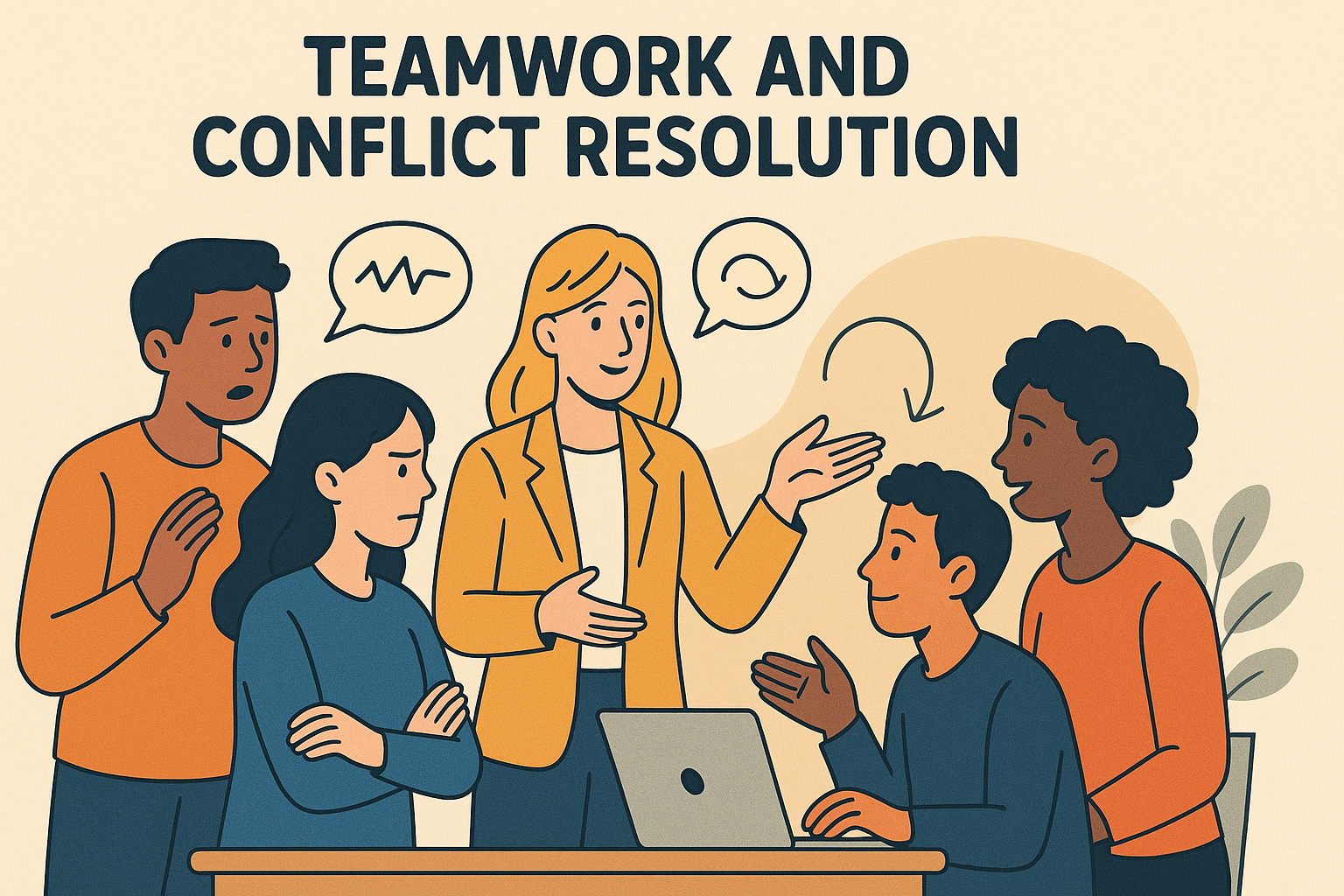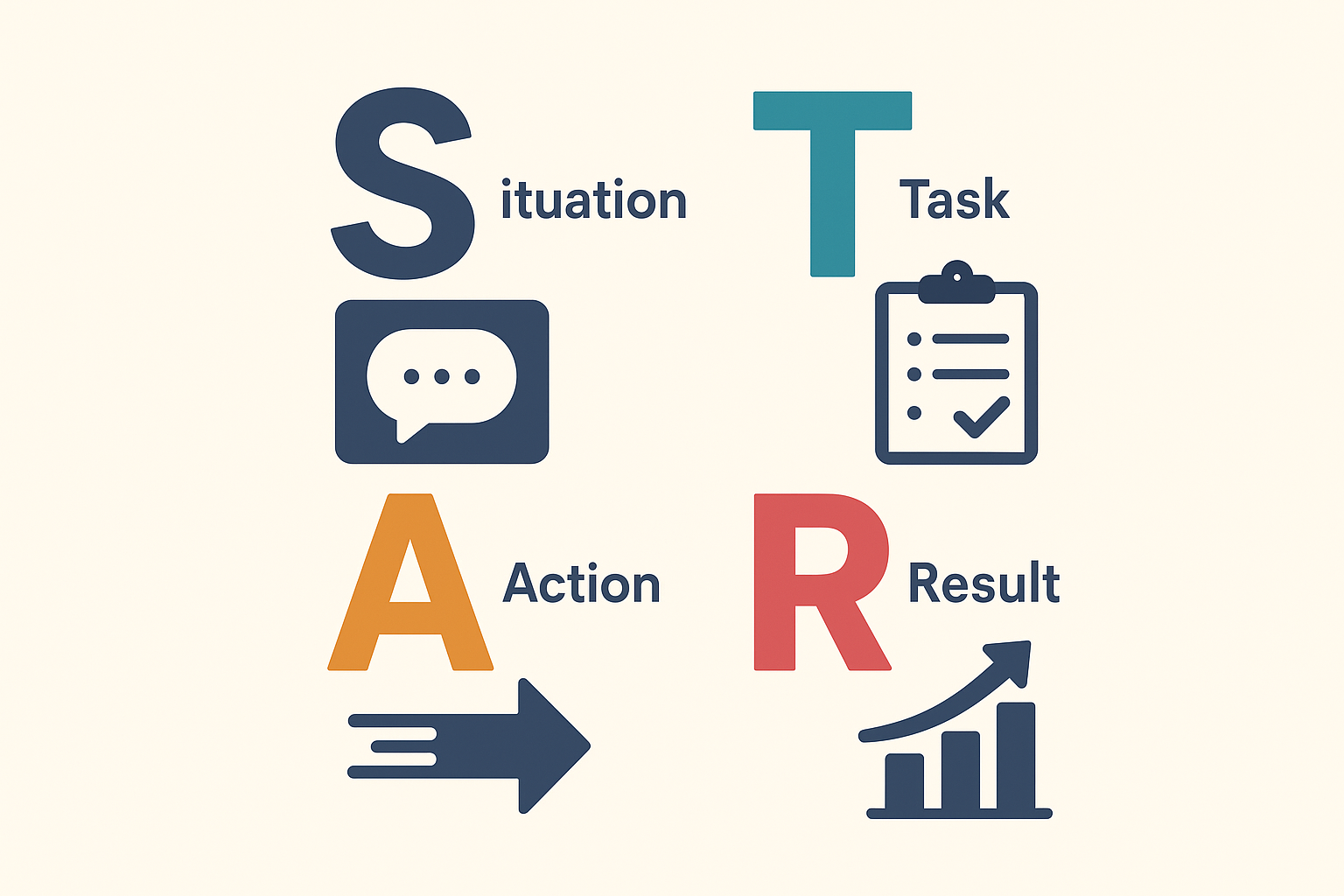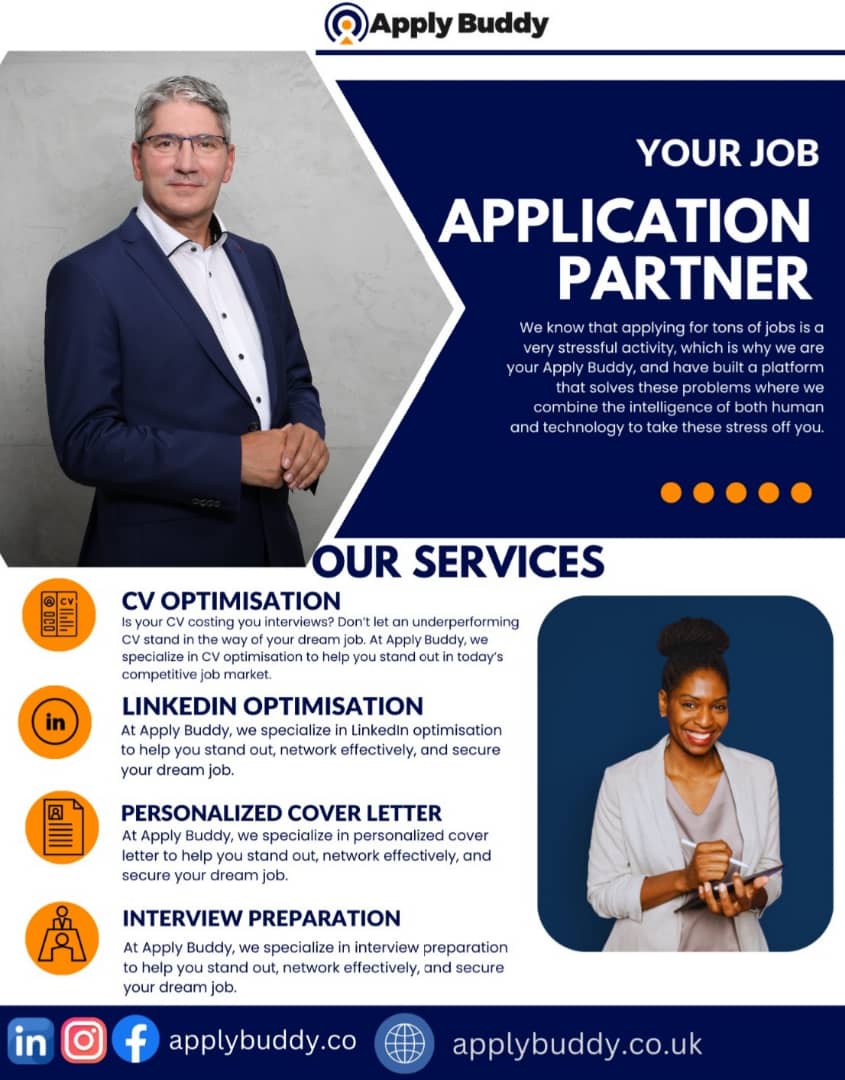Have you ever been asked in an interview, “Can you tell me about a time when…?” That’s one of scenario-based interview questions
If yes, then you’ve already seen a scenario-based interview question.
But what are scenario-based interview questions, exactly?
They are also called situational interview questions. These questions help employers understand how you act in real work situations. You might be asked how you solved a problem, worked with others, or made a tough choice.
Here’s the deal: Employers don’t just want to hear about your skills. They want to know how you’ve used those skills in real life.
These questions give them a better picture of how you work, especially when things are hard. They can show your problem-solving, teamwork, or leadership skills.
Let’s say you’re changing jobs or trying a new career. These questions can help you talk about your past experiences and how they fit the new role.
But why do employers use them so often?
Great question. We’ll look at that next and job interview tips UK.
But stay with me, this part is key to doing well in your next job interview.
Read Also:
- Competency and Behavioural Competency Interview Questions
- How to Ask Thoughtful Questions at the End of an Interview
Understanding Scenario-Based Interview Questions
Scenario-based questions are more than just simple interview questions. They help the employer understand how you solve problems, deal with people, and make decisions.
They focus on your actions, not just your ideas.
Definition and purpose
Scenario-based or situational interview questions ask how you handled something before, or how you might handle it later.
Here’s an example:
What would you do if your team missed a project deadline?
Tell me about a time when you disagreed with your manager.
These questions are based on real situations. The goal is to see how you think and behave at work.
The bottom line?
They help the employer decide if you can do the job well under pressure.
Why employers use them
Now, why are these questions so popular?
Here’s why.
According to the National Association of Colleges and Employers, 89% of employers say problem-solving is one of the top skills they look for when hiring.
These questions show how you act in real situations. They’re more honest than just asking about skills or goals.
They are also used in remote interviews. In fact, LinkedIn says 70% of hiring managers use situational questions when doing online interviews.
So yes, if you’re applying for remote jobs, expect them too.
Here’s the kicker.
Scenario questions are used in every industry, including tech, healthcare, customer service, finance, you name it.
Common formats and structure
You may be wondering: how do these questions usually sound?
Here are the three common types:
- Past events: Tell me about a time you had to deal with a hard customer.
- What-if questions: What would you do if your teammate weren’t doing their work?
- Problem-solving: How would you handle missing an important deadline?
These are often used in competency-based interview questions.
The good news?
You can learn to answer them in a way that makes you stand out. And that’s precisely what we’ll talk about next.
Read Also:
- How to Prepare for Behavioural Interview Questions
- Preparing for Interviews Like a Pro: Tipe to Land Your Dream Job
Examples of Scenario-Based Interview Questions
Let’s take a closer look at the kinds of questions you might get in a scenario-based interview.
These questions are not random. Each one is built to test a skill that matters in the job.
Here’s one:
They want to see how you solve problems, work with others, and make good choices when things don’t go as planned.
Let’s break these questions into three common areas.
Problem-solving scenarios
These are questions where you’re asked how you fixed a hard problem at work.
Some sample scenario-based questions include:
Tell me about a time you had to finish a task with little time.
What would you do if a client was unhappy with your work?
How did you solve a mistake you made at work?
These questions help interviewers see how you react when things go wrong.
And here’s something you should know:
A report by McKinsey & Company says problem-solving is one of the top five skills needed in today’s workforce.
Teamwork and conflict resolution examples

These questions check how well you work with others. They may also ask about times you dealt with conflict.
Here are some examples:
- Can you tell me about a time when you had a team disagreement?
- What did you do when a co-worker didn’t finish their part of a project?
- How would you handle a team member who is not listening to others?
These are great ways to show your people skills and calm thinking.
You may be wondering: What kind of answers work best?
Try to give clear and honest interview scenario answers. Don’t try to sound perfect. Focus on how you stayed calm, worked with others, and fixed the issue.
Decision-making and leadership situations
Now let’s talk about leadership. Even if you’re not applying for a manager role, decision-making matters.
These questions test if you can lead when needed.
Examples include:
- Tell me about a time you had to make a quick choice at work.
- What would you do if your boss was not around and you had to make a call?
- Can you give an example of when you led a small group or task?
These situational interview questions help the hiring manager see if you’re ready to take responsibility.
The bottom line?
Each of these question types gives you a chance to talk about your real work experience. Use the moment to show your value.
Want to know the best part?
You don’t need a perfect job history to do well. You just need real examples and clear answers.
And next, we’ll show you how to give those answers in a smart and simple way.
Read Also:
How to Answer Scenario-Based Interview Questions Effectively
If the question in your heart is how to answer job interview questions, then pay attention. You’ve seen the types of questions. Now, let’s talk about how to answer them well.
But how can you give strong interview scenario answers every time?
Here’s how.
You need a method that helps you stay clear, focused, and confident. That’s where the STAR method comes in.
Using the STAR method (Situation, Task, Action, Result)

The STAR method is one of the best tools to answer scenario-based interview questions. It helps you stay on track and avoid long or confusing answers.
Here’s what STAR stands for:
- Situation – What was the problem or setting?
- Task – What was your role?
- Action – What steps did you take?
- Result – What happened at the end?
Here’s an example:
Question: Tell me about a time you had a tight deadline.
Answer using STAR:
Situation: At my old job, we had to finish a report in two days instead of five.
Task: I was in charge of putting the data together.
Action: I stayed late, got help from a teammate, and used templates to save time.
Result: We finished the report early, and the manager praised our work.
Simple, right?
That’s the power of STAR method interview prep. It gives your answer a clear story that’s easy to follow.
Highlighting transferable skills
What if you’re changing careers?
Don’t worry. You can still use scenario-based interview questions to show your value. The key is to highlight transferable skills.
These are skills you used in your old job that fit well with the new job.
For example:
- If you have led a team before, talk about leadership.
- If you solved customer issues, talk about problem-solving.
- If you worked with others, talk about teamwork.
It gets better.
Even if your past job was in a different field, skills like clear communication, time management, and staying calm under pressure still count.
So yes, this works for career changers too.
Avoiding vague or generic responses
Now, let’s talk about a big mistake.
Some people give answers that are too general. For example:
I always try to do my best and work well with everyone.
That sounds nice. But it doesn’t say much.
Want to know the best part?
You can stand out by being specific. Use real situations from work, school, or volunteer work. Be honest. Keep it simple.
Here’s something we can both agree on:
Interviewers remember stories, not statements.
So the next time you’re asked a situational interview question, don’t just say you’re good at solving problems, show it with an example.
Read Also:
Tips to Prepare for Scenario-Based Interviews
Now that you know how to answer scenario-based interview questions, it’s time to prepare.
The good news?
You don’t need to guess what to say. You just need the proper steps to feel ready and confident.
Here are three simple tips that can help.
Identify common scenarios in your industry
Every job has its own set of common problems. If you know what they are, you can prepare answers in advance.
For example:
In retail, you may be asked how you handled a difficult customer.
They might ask how you solved a system error in tech.
In healthcare, you may talk about staying calm in an emergency.
Look at the job ad. Pay attention to keywords like teamwork, problem-solving, or leadership. These are hints about what they may ask.
Want to know the best part?
Most jobs ask about the same types of soft skills. So if you prepare a few strong examples, you can reuse them across many interviews.
Practice with mock interviews or feedback tools
Practice makes perfect, right?
One of the best ways to get better is to try mock interview practice. You can ask a friend to play the role of the interviewer. Or record yourself answering questions.
There are also online tools that give feedback on how clear or confident you sound.
Here’s something we can both agree on:
The more you practice, the less nervous you’ll feel on the big day.
And if you get stuck, review your STAR stories and try again.
Read Also:
Tailor your answers to the job role and company
You may be wondering: Do I need a new answer for every interview?
Not always. But you should adjust your examples a little for each job.
Look at the company’s website. Check their values and goals. Then match your answer to what matters most to them.
For example:
If the job ad talks a lot about teamwork, pick stories that show you worked well with others.
If they focus on leadership, choose a time when you took charge.
The bottom line?
Even if your story stays the same, the way you tell it can change to fit the role.
Conclusion
Scenario-based interview questions are not meant to trick you. They’re there to help employers understand how you think, act, and solve problems.
Whether you’re a mid-career professional, switching industries, or applying for your first remote role, the key is simple: prepare with real stories, use the STAR method, and stay calm.
Here’s something we can both agree on:
Practice makes a big difference. The more you prepare, the more confident you’ll feel.
Need help getting ready for your next interview?
That’s where Applybuddy comes in.

We offer one-on-one interview prep support, including mock interviews, feedback, and expert guidance on how to answer scenario-based and behavioural questions the right way. Whether you’re applying in the UK or internationally, we’ll help you shine.
Want to walk into your next interview feeling ready, calm, and confident?
Applybuddy is here to help you succeed.
FAQs
What is the difference between behavioural and scenario-based questions?
Behavioural questions ask what you did in the past. Scenario-based questions ask what you would do in a future situation. Both are used to check your skills and how you handle work situations.
Are scenario-based interviews used for remote jobs, too?
Yes. Many remote interviews include scenario-based questions. Employers use them to understand how you think and act, especially when they can’t meet you in person.
How do I prepare for scenario-based questions as a career changer?
Focus on skills that apply to any job, like teamwork, problem-solving, and communication. Use real examples from your past jobs, school, or volunteering.
Can I use the same example for multiple interview questions?
Yes, but change how you tell it depending on the question. Try to prepare at least two or three examples so your answers don’t sound repetitive.
